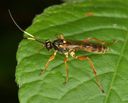Setanta compta
Classification
- Phylum: Arthropoda
- Subphylum: Hexapoda
- Class: Insecta
- Order: Hymenoptera
- Superfamily: Ichneumonoidea
- Family: Ichneumonidae
- Subfamily: Ichneumoninae
- Tribe: Ichneumonini
- Genus: Setanta
- Species: compta
Pronunciation
How to pronounce Setanta compta: //sɛˈtæn.tə ˈkɒmp.tə//
These audio files are automatically generated. While they are not always 100% accurate, they are a good starting point.
Images




Summary
Setanta compta, a member of the family Ichneumonidae, is known for its distinct sexual dimorphisms and geographical variations. With two recognized subspecies, it is mainly found in the eastern United States and plays a vital role in ecosystems as a parasitic wasp.
Physical Characteristics
Females have white bands on the antennae and often narrower yellow bands on the abdomen; males have entirely black antennae and often wider yellow bands on the abdomen. Females of S. c. compta feature yellow lines on the mesoscutum and broader abdominal bands; females of S. c. marginata are characterized by black mesoscutum, sterna, and pleura with narrower abdominal bands.
Identification Tips
Males can be identified by their black antennae and broader yellow abdominal bands, while females can be identified through their white antennae bands and abdominal band width.
Habitat
Primarily found in various ecological regions within the eastern United States; occurs in the Neotropical, Oriental, and Tropical regions.
Distribution
Widespread in the eastern United States; S. c. compta is primarily northern, while S. c. marginata has a widespread but primarily southern range.
Diet
As parasitic wasps, they primarily feed on other insects during larval stages, using hosts to grow.
Life Cycle
Life cycle includes egg-laying in host organisms, followed by larval development which usually occurs within the host, ultimately leading to adult emergence.
Reproduction
Description of current reproduction methods not provided; typically involves oviposition in host species by females.
Ecosystem Role
As a parasitoid, Setanta compta plays a role in controlling pest insect populations.
Similar Taxa
Tags
- Wasps
- Ichneumonidae
- Setanta